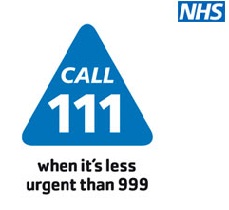NHS Helpline Operator Failed to Give Appropriate Advice: Baby’s Death Could Have Been Avoided
NHS Helpline Operator Failed to Give Appropriate Advice: Baby’s Death Could Have Been Avoided

An inquest has heard that the death of a baby could have been avoided, however NHS 111 staff missed the opportunity to save the infant’s life. William Mead died after a helpline operator, who was not medically trained, “worked from a script” and failed to give the child’s mother appropriate advice.
A NHS helpline operator, with no medical training, advised plenty of fluids
William Mead died at just 12-months-old after a member of staff at NHS 111 failed to tell his desperate mother to take the child to hospital immediately.
Shortly before his death, William had experienced a range of health complaints. He first developed a chesty cough in late September 2014 and when taken to the doctor, he was diagnosed with tonsillitis and prescribed antibiotics. One day later he was diagnosed with scarlet fever – a bacterial illness that mainly affects children and causes a distinctive pink-red rash. A month later, the doctor re-examined William and heard “crackles” in his chest, prescribing him an inhaler.
Just six days before his death in December 2014, William had his one-year booster jab. However, his mother Melissa said he became very unwell a few days later and developed a high temperature and was repeatedly vomiting. She took him to the GP, who told the anxious parents “it was nothing grisly”.
After his condition worsened the next day, Mrs Mead called the out-of-hours 111 service. A helpline operator, with no medical training, advised her to give her baby plenty of fluids, Calpol and Ibuprofen. William died shortly after. The one-year-old had developed an abscess in his left lung caused by the bacterial infection streptococcus A. If he had been admitted to hospital immediately, he could still be alive today.
“A very good chance William could have been treated successfully”
Speaking at the inquest, Professor Fleming, an expert witness from Bristol Children’s Hospital, said streptococcus A was a ‘rapidly progressive condition’. He speculated that it was likely that the abscess would have been present on the Friday when William visited the GP but it would have been ‘notoriously hard’ to spot in a small child. However, he said that had appropriate advice been given when Mrs Mead rang the NHS 111 service, there was “a very good chance that [William’s] illness could have been treated successfully.’
Professor Flemming stated: “One of the difficulties that 111 faces is that they are not talking to a skilled professional – they are working from a script, not their professional knowledge. The script does not cover what is a very rare event.”
The 111 helpline was launched in Spring 2013 to provide round the clock help to the public with the aim of reducing A&E numbers. The NHS website’s description of the service states it should be used if “you urgently need medical help or advice but it’s not a life-threatening situation.” It is claimed that the helpline is staffed by a “team of fully trained advisers, supported by experienced nurses and paramedics”, but a whistleblower has revealed that staff have just six weeks training and read from a series of questions on a computer screen, which generates advice based on their answers.
In William’s case, the inquest heard that the ‘algorithm’ used by the 111 service did not appear to have assessed the situation effectively. Consequently, the seriousness of his condition was not picked up.
Coroner Dr Emma Carlyon expressed her sympathy to William’s family. She said the cause of death was septicemia and recorded a verdict of death by natural causes. She said changes had been made to the out-of-hours service and that concerns about the algorithm had been addressed.
After the inquest, Mrs Mead said her family had been torn apart by the loss of her ‘beautiful’ and ‘perfect’ little boy.
She said: ‘We can only hope that no other family has to suffer the unrelenting agony of losing a child in these circumstances and that changes brought about by today’s outcome can prevent future deaths and improve the practice of GPs and the 111 and out of hours service.’
Compensation for victims of NHS Negligence
You are entitled to expect a certain standard of treatment from those providing medical assistance to you. If this treatment falls below standard you may be entitled to recover the cost of the private medical treatment needed to correct the failings on the part of those originally treating you. Our goal at IBB Solicitors is to obtain justice for victims of the negligence by others, by securing compensation that reflects their pain and suffering, as well as related financial losses including loss of earnings, treatment costs and specialist care costs.
If you want to enquire about making a NHS negligence claim, please contact one of our medical negligence solicitors on 01895 207835 or 01895 207295.
Alternatively, you can send an email with your name and contact information and brief details as to the nature of the accident/clinical negligence and the injuries sustained to malcolm.underhill@ibblaw.co.uk and one of our team will be able to help you.
CONTACT OUR NO-WIN NO-FEE SOLICITORS FOR A FREE CONSULTATION
